 CANONIZED TODAY:
CANONIZED TODAY:
5 new saints include
Portugal's national hero
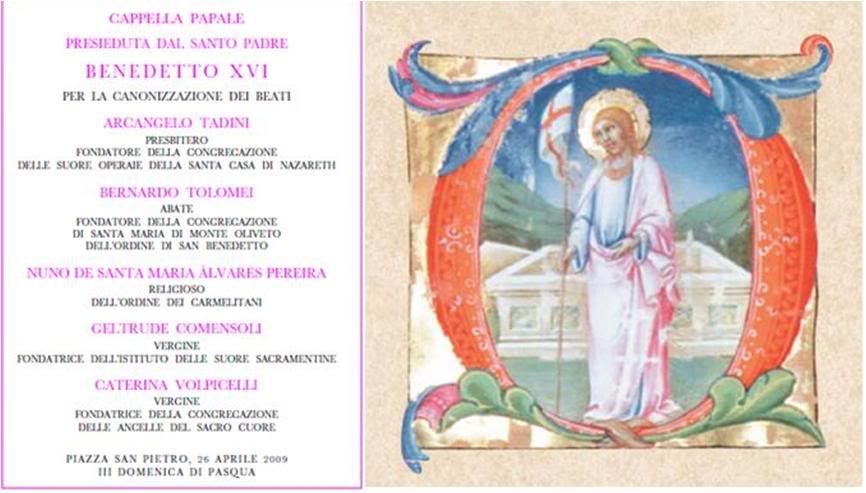
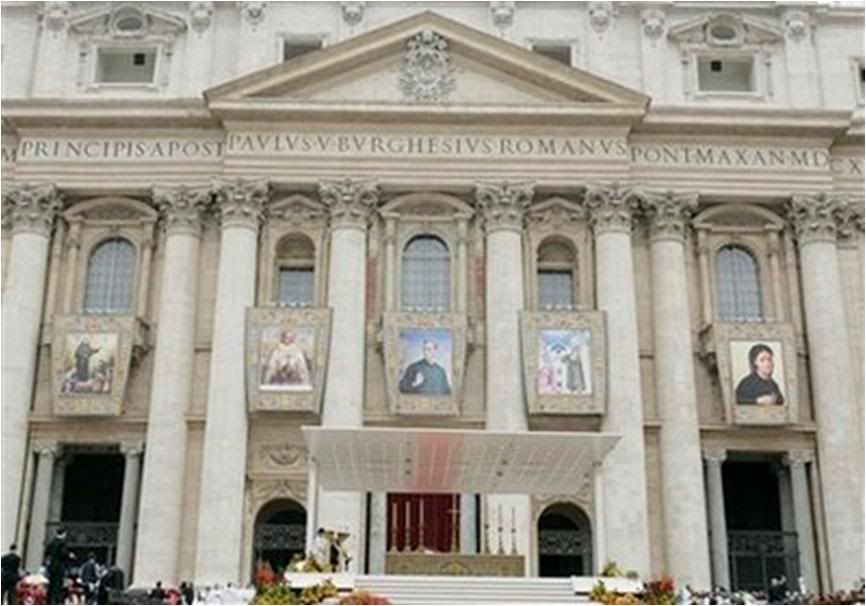 Below left, St. Nuno; Right photo: New saints, from left, Gertrude Comensoli, Bernard Tolomei, Arcangelo Tadini, Nuno Alvarez Pereira, Caterina Volpicelli.
Below left, St. Nuno; Right photo: New saints, from left, Gertrude Comensoli, Bernard Tolomei, Arcangelo Tadini, Nuno Alvarez Pereira, Caterina Volpicelli.
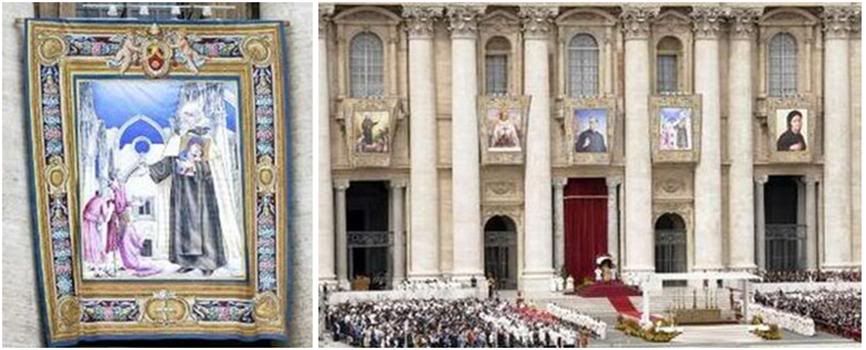 Pope Benedict proclaims new saints
Pope Benedict proclaims new saints
By Stephen Brown and Andrei Khalip

VATICAN CITY/LISBON, April 26 (Reuters) – Pope Benedict created five new saints on Sunday, including Portugal's national hero Nuno Alvares Pereira, a medieval warrior-friar credited with securing Portugal's independence from Castile.
The Pope told pilgrims at the canonization in the Vatican that the 14th-century nobleman had shown that "in any situation, even of a military and warlike nature, it is possible to act and live out the values and principles of Christian life."
His canonization has been the subject of much excitement among Roman Catholics in Portugal, with exhibitions about his life drawing large crowds, biographies published and the launch of a commemorative postage stamp carrying his portrait.
The Portuguese Bishops' Conference drew comparisons between the 1383-1385 crisis of succession in Portugal and the current global economic crisis "stemming from a vacuum of moral values," citing the saint's example of sobriety and sharing of wealth.
"We want this to be an anti-crisis celebration. We want the canonization to be a sign of hope," friar Francisco Rodrigues, who led the canonization effort, said earlier this week.
Born in 1360 and appointed Constable of the Kingdom at just 24, his 6,500 Portuguese troops defeated over 30,000 Castilians in the battle of Aljubarrota in 1385 to quash Castilian claims on Portuguese lands, bringing about two centuries of peace.
The richest man in Portugal, Alvares Pereira gave up all his titles and wealth to become a friar in the Carmo Convent he had built in Lisbon, spending his last years in prayer and penitence under the name Friar Nuno of St Mary.
Long venerated in Portugal and its former colonies, there were attempts to canonize him at least as long ago as the 15th century and he was beatified in 1918. But it took a miracle attributed to him in 2000 - believers say he intervened to cure a woman's eye burned by boiling oil -- to culminate the process.
The other saints created included early 14th-century Sienese aristocrat Bernardo Tolomei, who died along with 82 monks of his order while helping victims of the Great Plague of 1348.
Three 19th-century Italians -- the priest Arcangelo Tadini and two women, Geltrude Comensoli and Caterina Volpicelli, who took vows of chastity and founded congregations of nuns -- were canonized for helping the poor and their dedication to prayer.

VATICAN CITY, April 26 (AP) - Pope Benedict XVI canonized five new saints today, including Portugal's 14th century independence leader and an Italian monk who died of the plague after tending to the sick.
Benedict presided over the ceremony in St. Peter's Square, decorated with tapestries featuring pictures of each of the five.
The only non-Italian in the lineup is Nuno Alvares Pereira, who led Portuguese forces to defeat the Castilians at the Battle of Aljubarrota in 1385, securing the independence of Portugal. After leaving the military, he entered religious life as a Carmelite.
Also canonized was Bernardo Tolomei, who founded the Congregation of St. Mary of the Mount of Olives in the 1340s. He died in 1348 along with 82 of his monks after tending to plague victims.

ROME, April 26 (dpa) - Pope Benedict XVI has canonized five new saints - including the heroic 14th century Portuguese General Nuno de Santa Maria Alvares Pereira.
Thousands of Portuguese faithful travelled to Rome to hear the pontiff's announcement at St Peter's Square on the military man turned Carmelite monk and four others Sunday.
During the ceremony, Benedict renewed his appeal for a just society and solidarity in the struggle against economic inequality affecting the better part of the world.
The latest canonization also included Italy's Arcangelo Tadini (1846-1912), who founded the Benedictine order of Monte Oliveto; the 14th century monk, Bernhard Tolomei (1272-1348) and nuns Gertrude Comensoli (1847-1903) and Caterina Volpicelli (1839-1894).
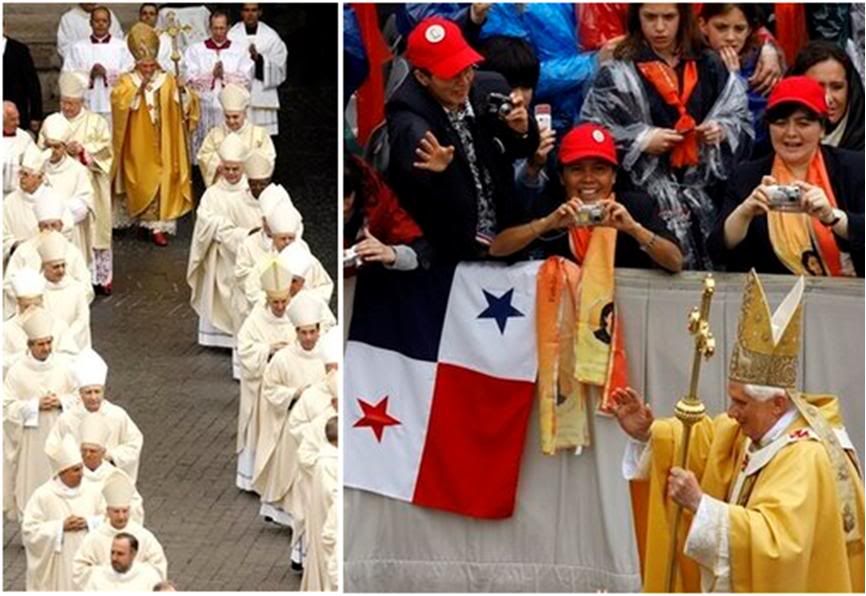
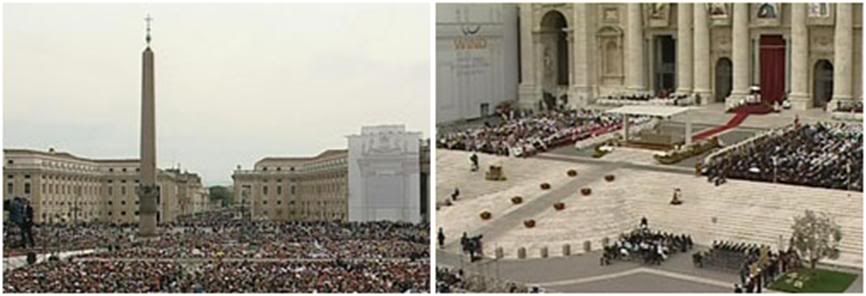
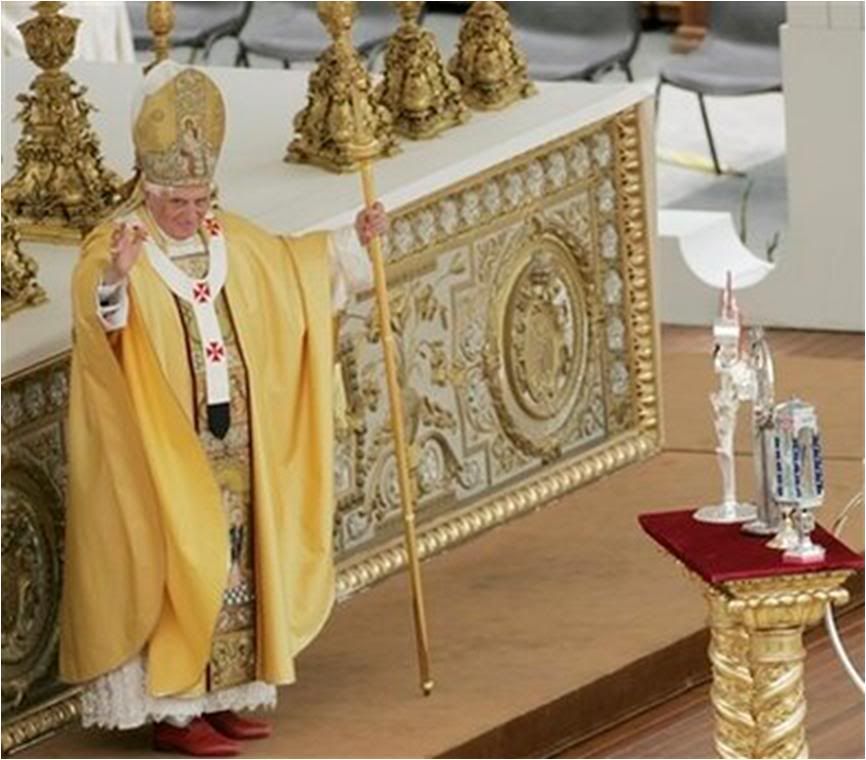
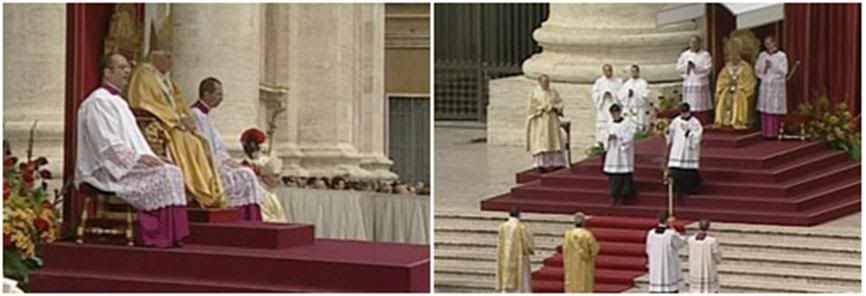
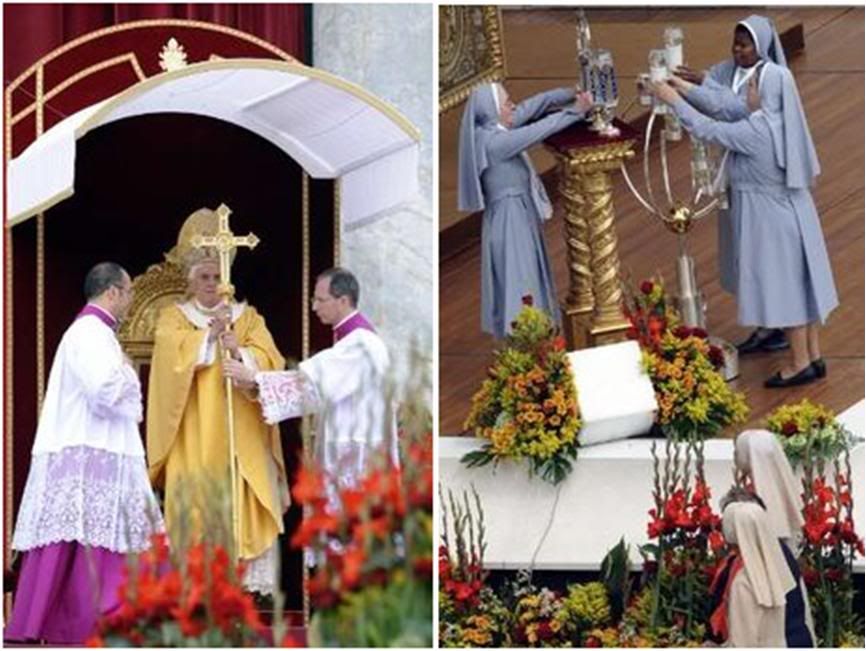
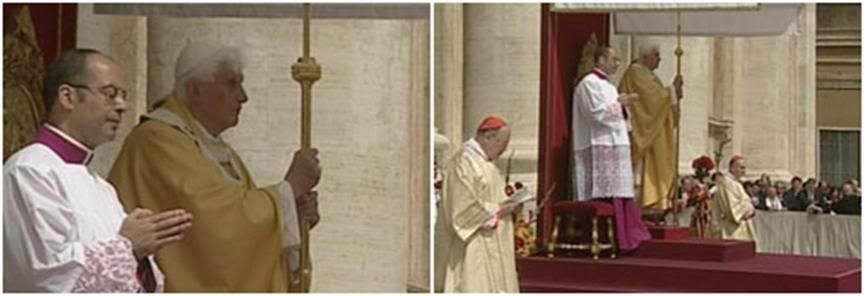
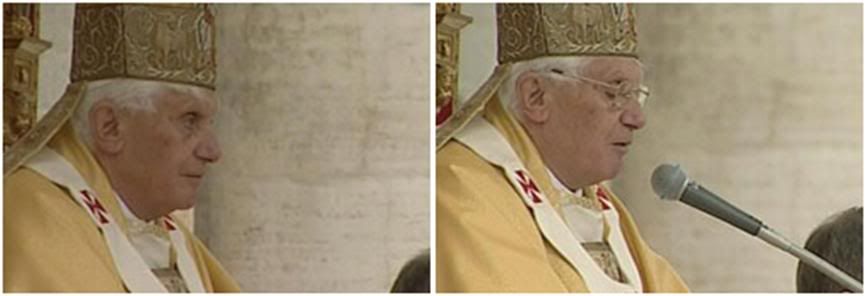 Here is a translation of the homily today:
Here is a translation of the homily today:
THE HOLY FATHER'S HOMILY
Dear brothers and sisters,
On this third Sunday in Easter time, the liturgy once again places at the center of our attention the mystery of the risen Christ.
Victorious over evil and death, the Author of our life, who immolated himself as expiatory victim for our sins, and "continues to offer himself for us and intercedes as our advocate; sacrificed on the cross, cannot die any more, and with the signs of the passion, lives immortal" (cfr Paschal Preface 3).
Let us allow ourselves to be flooded interiorly with the Easter splendor that comes from this great mystery, and with the Responsorial Psalm, let us pray, "Lord, let your face shine on us".
The light from the face of the risen Christ shines today on us particularly through the evangelical traits of the five Blessed Ones who in this celebration we inscribe into the album of saints: Arcangelo Tadini, Bernardo Tolomei, Nuno de Santa Maria Álvares Pereira, Gertrude Comensoli and Caterina Volpicelli.
I gladly join the homage rendered to them by the pilgrims who have gathered here from many nations, to whom I address my heartfelt greeting with great affection.
The different human and spiritual experiences of these new saints show us the profound renewal that the mystery of Christ's resurrection works in the heart of man: a fundamental mystery which orients and guides the entire story of salvation.
That is why the Church rightly and always - more so in Eastertide - invites us to turn our attention towards the risen Christ who is truly present in the sacrament of the Eucharist.
In today's Gospel, St. Luke recounts one of the apparitions of the risen Christ (24,35-48). At the start of this passage, the evangelist notes that the two disciples of Emmaus, who returned in haste to Jerusalem, related to the Eleven how they recognized the Lord 'in the breaking of bread" (v. 35).
And while they were recalling this extraordinary experience of their encounter with the Lord, 'he stood in their midst' (v. 36). Because of his unexpected apparition, the Apostles were startled and terrified, to the point that Jesus, to reassure them and overcome their every hesitation and doubt, asked them to touch him - he was not a phantasm, but a man of flesh and bone - and then, he asked them for something to eat.
Once more, as it had been with the two disciples at Emmaus, it is at table, eating with his own people, that the risen Christ manifests himself to the disciples, helping them to understand the Scriptures and to reread the events of salvation in the light of Easter.
"Everything written about me," he said to them, "in the law of Moses and in the prophets and psalms must be fulfilled" (v. 44). And he invited them to look to the future: "Repentance, for the forgiveness of sins, would be preached in his name to all the nations" (v. 47).
It is this same experience that every community relives in the Eucharistic celebration, especially on Sundays. The Eucharist, the privileged place in which the Church recognizes 'the Author of life' (cfr Acts 3,15) is the 'breaking of bread' as it is called in the Acts of the Apostles.
In the Eucharist, through faith, we enter into communion with Christ, who is 'altar, victim and priest' (cfr Easter Preface 3). We gather around him to commemorate his words and the events contained in Scripture. We relive his passion, death and resurrection.
Celebrating the Eucharist, we communicate with Christ, victim of expiation, and from him, we draw forgiveness and life. What would be our lives as Christians without the Eucharist? The Eucharist is the perpetual and living heritage left to us by the Lord in the Sacrament of his Body and Blood, which we must constantly rethink in depth so that, as the venerated Pope Paul VI said, it may "imprint its inexhaustible efficacy on all the days of our mortal life" (Teachings, V [1967]. p.779).
Nourished by the Eucharistic Bread, the saints we venerate today brought their mission of evangelical love to fulfillment in the various fields where they worked their individual charisms.
St. Arcangelo Tadini spent long hours in prayer before the Eucharist, and, always keeping in sight his pastoral ministry of the human being in his totality, helped his parishioners to grow humanly and spiritually.
This sainted priest, completely a man of God, ready at all times to let himself be guided by the Holy Spirit, was also able to grasp the urgencies of the moment and find remedies for them.
That is why he took on not a few concrete and courageous initiatives, like organizing the Società Operaia Cattolica di Mutuo Soccorso (Catholic Workers' Society for Mutual Aid), construction of a spinning mill and boarding school for the workers, and the foundation in 1900 of the Congregation of Working Sisters of the Holy House of Nazareth, with the aim of evangelizing the world of labor through work sharing, following the example of the Holy Family of Nazareth.
How prophetic was Fr. Tadini's charismatic intuition and how relevant his example remains even today, in a time of grave economic crisis! He reminds us that only by cultivating a constant and profound relationship with the Lord - especially in the sacrament of the Eucharist - are we able to bring the ferment of the Gospel to our various work activities and in every field of society.
Likewise, what stands out in St. Bernardo Tolomei, who began a singular Benedictine movement, was his love for prayer and manual labor. His was a eucharistic existence, totally dedicated to contemplation which he translated into humble service to his neighbor.
For his singular spirit of humility and fraternal hospitality, he was one of those monks who kept being re-elected abbot, in his case for 27 consecutive years until his death.
Moreover, in order to insure the future continuation of his work, he obtained from Clement VI on January 21, 1344, pontifical approval for a new Benedictine Congregation named after Santa Maria di Monte Oliveto.
During the great plague of 1348, he left the solitude of Mt Olivet for the Monastery of St. Benedict in Porta Tufi, Siena, to help his monks who had been struck by the plague, and died himself as a victim of the disease, an authentic martyr of charity.
From the example of this saint, we are invited to translate our faith into a life dedicated to God in prayer and spent in the service of our neighbor, urged on by a charity that is ready even for the supreme sacrifice.
The Pope switched to Portuguese to speak about the next saint:
"Know that the LORD works wonders for the faithful; the LORD hears when I call out." (Ps 4,4). These words of the Responsorial Psalm express the secret of the life of the blessed Nuno de Santa Maria, hero and saint of Portugal.
The 70 years of his life in the second half of the 14th century and the first half of the 15th, which saw that nation consolidate its independence from Castile and to extend its rule across the oceans -
according to God's design - offered new routes that were propitious for bringing the Gospel of Christ to the ends of the earth.
St. Nuno felt himself to be an instrument of this superior design, as someone enlisted in the militia Christi, that is to say, in the service of the testimony that every Christian is called on to give to the world through an intense life of prayer and absolute confidence in divine help.
Although he was an outstanding soldier and a great leader, he never allowed his personal gifts to get in the way of the supreme action that comes from God. St. Nuno sought not to place any obstacles to God's action on his life, imitating Our Lady to whom he was very devoted and to whom he publicly attributed his military victories.
In the twilight of his life, he retired to the convent of Carmo which he had earlier ordered to be built. I am very happy to indicate to the entire Church this exemplary figure for his life of faith and prayer in circumstances that are apparently not very favorable for them, as proof that in any situation, even of military circumstances and war, it is possible to carry out and realise the values and principles of Christian life, especially if it is in the service of the common good and the glory of God.
He resumed the homily in Italian:
From her childhood, St. Gertrude Comensoli felt a special attraction to Jesus present in the Eucharist. The adoration of Christ in the Eucharist became the principal aim of her life - we might even say, the habitual condition of her existence.
Indeed, it was in front of the Eucharist that St. Gertrude understood her vocation and mission in the Church: to dedicate herself without reservation to apostolic and missionary activity, especially for the benefit of the young.
Thus was born, in obedience to Pope Leo XIII, her institute which aimed to translate the 'contemplative charity' before the eucharistic Christ into a 'lived charity' of dedicating onself to one's needy neighbor.
In a disoriented and often wounded society, like ours is, to a youth such as those of our time, who are in search of values and a sense to their own existence, St. Gertrude points to God as a firm reference, who has made himself our travelling companion in the Eucharist.
She remidns us that "adoration should prevail over all works of charity" because it is from the love of the resurrected Christ, who is truly present in the Eucharistic sacrament, that all evangelical charity comes which impels us to consider all men our brothers.
Also a witness to divine love was St. Caterina Volpicelli, who strove "to be of Christ, in order to bring to Christ" everyone she could encounter in late 19th-century Naples, at a time of spiritual and social crises.
For her, too, the secret was the Eucharist. To her first co-worker, she urged cultivating an intense spiritual life in prayer, and above all, in vital contact with the eucharistic Christ. Even today, this is the condition for continuing the work and mission started by her and left as a legacy to her 'Ancelle del Sacro Cuore' (handmaids of the Sacred Heart).
In order to be authentic educators in the faith, desiring to transmit to the new generations the values of Christian culture, it is indispensable, she liked to repeat, to liberate God from the prisons in which men had confined him. And that indeed, only in the Heart of Christ could mankind find its 'stable dwelling'.
St. Caterina shows her spiritual children and all of us the demanding path of a conversion that changes the heart radically, and translates itself into actions consistent with the Gospel.
This way, it is possible to lay the bases for a society that is open to justice and solidarity, in order to overcome the economic and cultural imbalance that continues in a large part of our planet.
Dear brothers and sisters, let us thank the Lord for the gift of holiness, which today shines brilliantly in the Church with singular beauty in Arcangelo Tadini, Bernardo Tolomei, Nuno de Santa Maria Álvares Pereira, Gertrude Comensoli and Caterina Volpicelli.
Let us allow ourselves to be drawn by their examples, to be guided by their teachings, so that our own existence may become a canticle of praise to God, in the footsteps of Jesus, whom we adore with faith in the eucharistic mystery and whom we serve generously in our neighbor.
May we realize this evangelical mission with the maternal intercession of Mary, Queen of the Saints, and of these five new luminous examples of holiness whom we venerate with joy today. Amen!
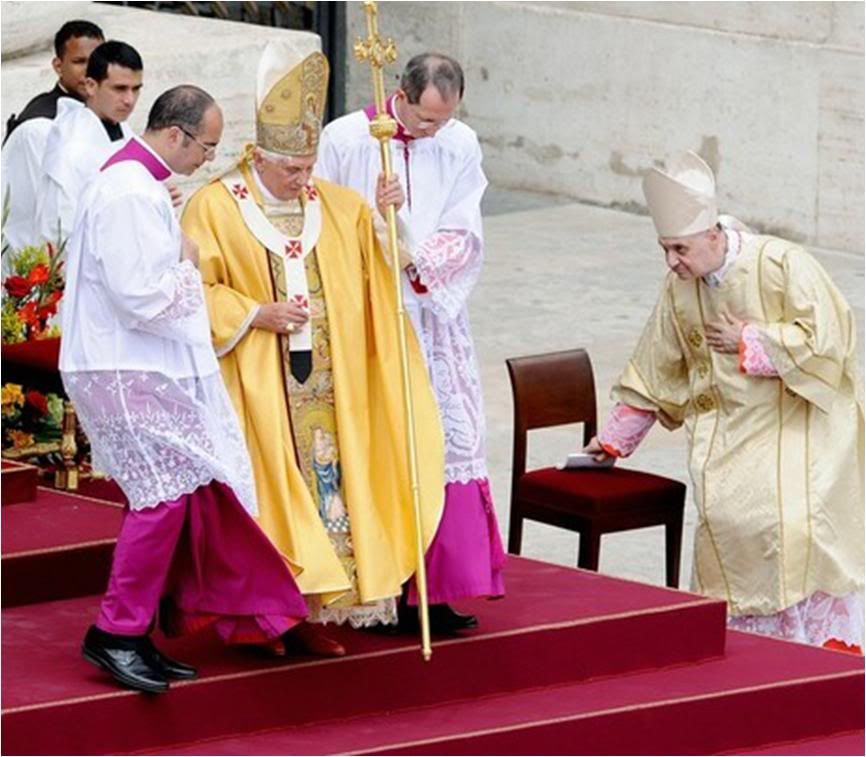
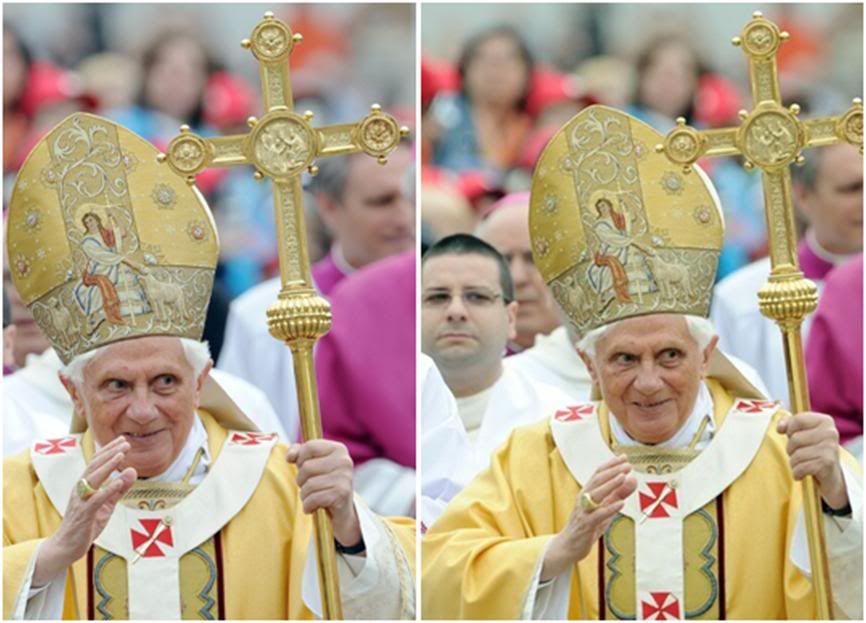 REGINA CAELI MESSAGES
At the end of tdoay's Mass, the Holy Father led the recitation of the noontime Regina Caeli, before which he said the following words, translated here:
REGINA CAELI MESSAGES
At the end of tdoay's Mass, the Holy Father led the recitation of the noontime Regina Caeli, before which he said the following words, translated here:
As we prepare to conclude this solemn celebration, I wish to address a heartfelt greeting to all of you who decided to come in person to pay homage to the new saints.
First of all, I express my acknowledgment to the delegation of the Italian government and to the other civilian authorities, particularly the mayors and prefects of the natal cities of your four compatriots who were elevated today to the honors of the altar.
I greet the delegation of the Order of Malta. And with great affection I thank the numerous pilgrims from many parts of Italy. I hope that this pilgrimage in the sign of holiness and enirched by the grace of the Pauline Year, may help everyone 'run' with greater joy and impulse towards the final 'goal', towards the "prize of God's upward calling, in Christ Jesus" )cfr Phil 3,13-14).
In this context, I am happy to call attention as well to the Day of the Catholic University of the Sacred Heart, which is celebrated today. Fifty years since the death of its founder, Fr. Agostino Gemelli, it is my hope that the Catholic University may always be faithful to its founding principles in order to continue providing a valid formation to the young generations.
In Portuguese he said:
I address my grateful and deferential greeting to the official delegation from Portugal adn her bishops who have come for the Canonization of Frei Nuno de Santa Maria, and to all your compatriots who look to the heart of the testimony of your 'Santo Condastavel' [Saint-General], the name by which already the poor people in his time called him, who saw or heard of his compassion and how he gave up all his wealth for the benefit of the less fortunate.
Indeed he left us a noble lesson in renunciation and sharing, without which it would be impossible to reach that fraternal equality that is the ideal of a modern society which recognizes and treats everyone as members of the same single human family.
I particularly greet the Carmelites, to whom one day this soldier believer came and took on himself the habit of the Most Blessed Virgin, in which he eventually died.
In wishing an abundance of God's gifts for all the pilgrims and the devotees of St. Nuno, I leave you with this word: "Consider the outcome of his way of life and imitate his faith" (cfr Heb 13, 7).
In English, he said:
I greet the English-speaking pilgrims who are here with us today, especially those who have travelled to Rome to be present at the canonization of today’s new saints.
Through their intercession, may all of you be filled with joy in the Risen Lord, and bear witness to him courageously in your daily lives. I invoke God’s abundant blessings upon all of you, and upon your families and loved ones at home.
[Modificato da TERESA BENEDETTA 26/04/2009 20:39]